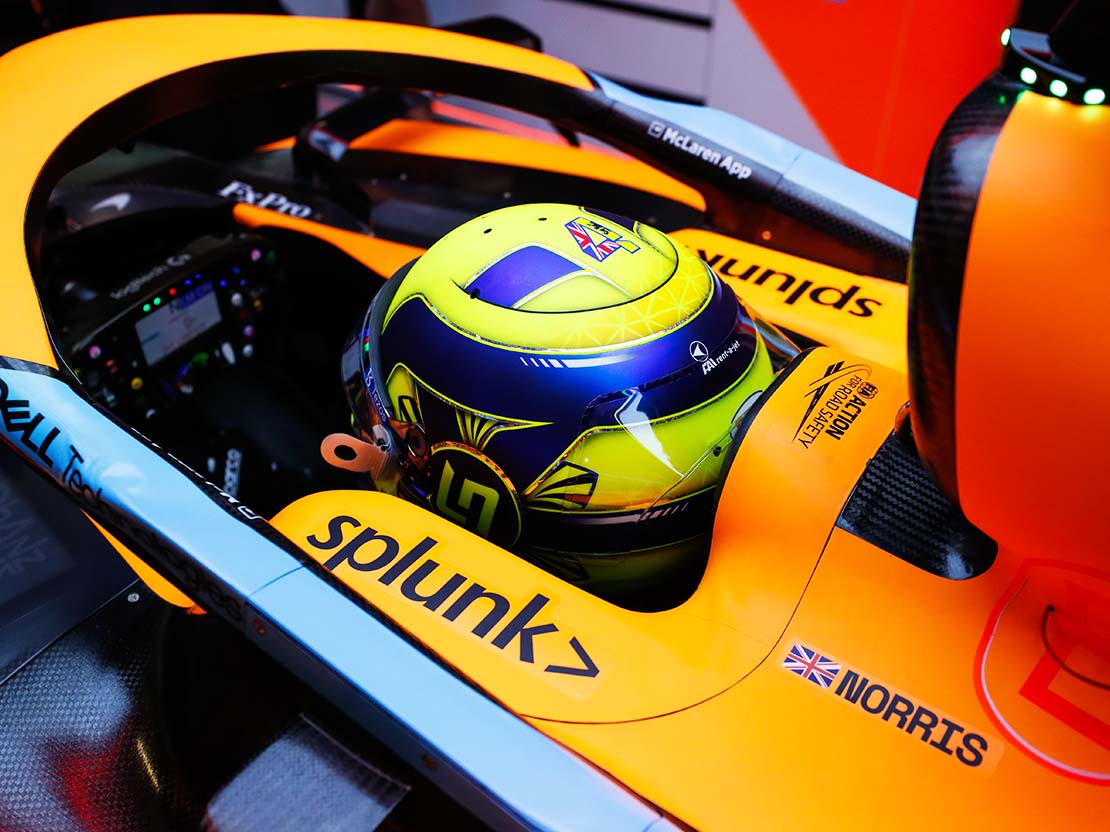Splunk is very critical in both our on-track and off-track performance. You need to have both because if we're not competitive off track, we won't be competitive on track.
McLaren needed a powerful data platform that could improve on-track decision-making, quicken innovation and manage a tremendous volume of data across its hybrid infrastructure.
By using Splunk to translate real-time data into actionable insights, McLaren sharpens its competitive edge and accelerates the pace of development in Formula 1 and esports racing.
In the world of F1, data can be the difference between a good race and an expensive defeat.
McLaren Racing is one of the most successful and innovative names in motorsports, winning 183 Formula 1 Grand Prix, three Indy 500s and the 24 Hours of Le Mans. In 2017, they entered esports with the McLaren Shadow Project virtual racing program and in 2022, went electric, fielding a team in the Extreme E series designed for all-electric off-road vehicles.
Victory is always the goal, but in Formula 1, even if you don’t cross the finish line first, vital championship points — and prize money — depend on how your car and driver perform every second of the race. Of the 20 cars that take the grid on race day, only those finishing in the top 10 get a points payout.
Managing to the millisecond places immense pressure on any F1 team. Knowing they needed a competitive data advantage, McLaren turned to Splunk. Providing McLaren with a powerful data platform for faster decision-making, Splunk has been a technology partner of the McLaren F1 team since 2020, extending the partnership to include the McLaren Shadow esports team in 2021.
Outcomes
- Improves operations, reliability and consistency for critical infrastructure
- Accelerates race car development through data-driven insights
- Streams and analyzes 100kHz of data per second for real-time decision-making
Innovation in overdrive
Roughly 18,000 parts on McLaren's Formula 1 car change every six weeks, meaning that about 80% of the racing car will be different by the end of the season.
"In Formula 1, if you're standing still, you're actually going backwards because of the teams' pace of development," says Zak Brown, CEO of McLaren Racing. "These are hundredths of seconds that all ultimately add up — so everything on our race car is data-driven."
With such a thin margin for error, IT must deliver at every stage of the season. “IT is involved in the entire end-to-end lifecycle of a Formula 1 car — from ideation, validation and production through to racing, data analysis and maintenance,” says Edward Green, head of commercial technology for McLaren Racing. “We are fearless in our approach to technology, and Splunk gives us greater insight into our systems so we can innovate and scale across the organization.”
This innovation even extends to how McLaren — which was voted the most popular team in F1 last year — connects with its fans. Green says, “We’re using data to be more predictive, targeting our engagement strategies toward what our fans need and how they want to connect.”
We are fearless in our approach to technology, and Splunk gives us greater insight into our systems so we can innovate and scale across the organization.
No data, no racing
On race weekends, McLaren must set its strategy in real time, streaming data from the car's nearly 300 telemetry sensors to its traveling trackside IT Rig while adjusting for everything from weather changes to tire conditions. A single miscalculation or network interruption could be the difference between finishing on the podium, or not in the points at all.
In testing, practice, qualifying and on race day, Splunk streams and analyzes 100kHz of data per second to give McLaren the insights they need for real-time decision-making. Managing such a tremendous volume of data across on-premises, cloud and edge landscapes creates a high degree of complexity — especially when car, tire, track and weather conditions change in an instant.
“With Splunk, we provide better operations, more reliability and greater consistency,” says Green. “Our infrastructure is critical; if a server or database is not available right away, we can’t go on track and compete. We’ve never had the level of insight that Splunk provides before, and it’s helping us consistently deliver an exceptional IT experience.”
Accelerating into the world of esports
McLaren’s foray into the world of esports has unleashed new possibilities for the British racing team. Not only does the McLaren Shadow team provide a competitive platform for established gamers and up-and-coming racing talent, esports also affords new opportunities for gathering data.
This additional access to insights is critical given that F1 teams only get three practice sessions, qualifying and the race to collect as much data as they can. And with 23 races this season — more than ever before — the window for change is even smaller.
“We can easily stream data from the esports rigs into Splunk so the F1 team can practice, experiment and optimize performance,” says Green. “By clearly seeing the data within Splunk, Lando has come to us with new ideas for what he’d like to see on track.”
Driven by data
Formula 1 racing is one of the fastest-moving and most challenging of sporting endeavors: developing and perfecting the car, driving it at high speeds while undergoing five times the force of gravity, and making critical, split-second decisions.
And as McLaren’s efforts expand in IndyCar, Extreme E and esports, so does their need for a platform that can manage complexity while handling multiple racing series. Green sees Splunk as vital to helping them manage their transition to a more cloud-based network infrastructure and widen the scope of what’s possible with data. “One of the most valuable aspects of Splunk has been its ability to spark curiosity and innovation across the organization,” says Green.
One of the most valuable aspects of Splunk has been its ability to spark curiosity and innovation across the organization.
As the speed of the challenges increase, so does the need to manage data in milliseconds. Grit, determination, hard work and boldness will always be essential to Formula 1 success, but now, so is the ability to manage data in milliseconds with a technology partner like Splunk.
Brown says, "Splunk is very critical in both our on-track and off-track performance. You need to have both because if we're not competitive off track, we won't be competitive on track."









